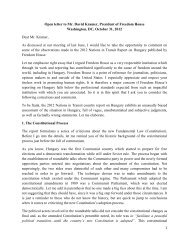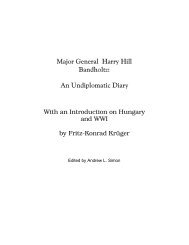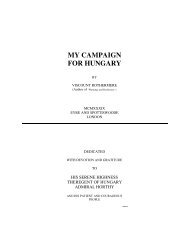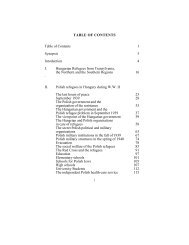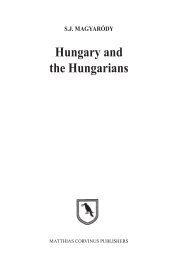The Fate of Western Hungary 1918-1921 - Corvinus Library ...
The Fate of Western Hungary 1918-1921 - Corvinus Library ...
The Fate of Western Hungary 1918-1921 - Corvinus Library ...
You also want an ePaper? Increase the reach of your titles
YUMPU automatically turns print PDFs into web optimized ePapers that Google loves.
which, 19,164 voters, were to be found in the eight districts <strong>of</strong> Sopron and in<br />
Brennbergbánya, considered the 9 th district <strong>of</strong> Sopron. <strong>The</strong> minority, 7,905<br />
persons, resided in the surrounding eight villages. Of the total, 24,063 cast<br />
ballots (17,298 in Sopron, 6,765 in the surrounding villages) with a mere 502<br />
spoiled ballots. Of the valid 23,561 ballots cast, 15,334 (65.1%) elected to stay<br />
with <strong>Hungary</strong> and 8,227 (34.9%) opted for Austria. It is important to note that<br />
the citizenry <strong>of</strong> Sopron decided referendum results favorable to <strong>Hungary</strong>:<br />
72.8% <strong>of</strong> the city’s electorate voted for staying with their ancient homeland,<br />
while only 27.2% voted against it. In the surrounding eight villages, the similar<br />
result was 45.5% for and 54.5% against. 499 As a result <strong>of</strong> the referendum <strong>of</strong><br />
Sopron and the eight villages – Ágfalva, Balf, Bánfalva, Brennbergbánya,<br />
Felsőboz, Fertőrákos, Harka, Kópháza, and Nagycenk – a total <strong>of</strong> 256.82 km 2<br />
was able to be retained by <strong>Hungary</strong>. 500<br />
According to the data <strong>of</strong> the 1920 census, the referendum area had a total<br />
population <strong>of</strong> 50,021, whose language distribution was: 19,525 (39.0%)<br />
Hungarian, 27,473 (54.9%) German, 2,472 (5.0%) Croat and 551 (1.1%) other.<br />
Of the total population <strong>of</strong> 50,021, 34,197 spoke Hungarian. Another important<br />
fact to note: <strong>of</strong> the 35,248 people <strong>of</strong> Sopron according to the census, 28,467<br />
(80.8%) spoke Hungarian, while the linguistic make up <strong>of</strong> the city was 17,166<br />
(48.7%) Hungarian, 16,911 (48.0%) German, 733 (2.1%) Croat and 438 (1.2%)<br />
other. 501<br />
In the days following the plebiscite, indeed to this day, Austrian public<br />
opinion asserted a “great fraud” by the Hungarians, when, according to them,<br />
Sopron was “fraudulently stolen” from Austria. <strong>The</strong> first to state this opinion<br />
was Viktor Miltschinsky, the Austrian referendum delegate, who published a<br />
book in 1922 in Vienna, recounting in detail the circumstances <strong>of</strong> the voting. In<br />
it, he openly calls the Sopron plebiscite as a crime (Verbrechen) because, in a<br />
perfect vote, according to him, 70-80% would have decided with Austria. He<br />
wrote that, on the day <strong>of</strong> the referendum, every street in Sopron, indeed every<br />
house, had trusted persons. To prevent disorder, they led groups <strong>of</strong> citizens to<br />
499 Villani, 1923, op. cit., pp. 32–34.<br />
500 Ibid, p. 87; Horváth, Zoltán: Három ország versengése Nyugat-Magyarországért. A<br />
soproni népszavazás 50. évfordulóján. I. rész [<strong>The</strong> contest <strong>of</strong> three countries for<br />
<strong>Western</strong> <strong>Hungary</strong>. On the 50 th anniversary <strong>of</strong> the Sopron plebiscite. Part I]. In: Kisalföld<br />
(Győr), 1971, December 14, p. 6; Part II, December 15, p. 5; Fogarassy, László: A<br />
soproni népszavazás helye Európa korabeli diplomáciai történetében [<strong>The</strong> position <strong>of</strong><br />
the Sopron plebiscite in the diplomatic history <strong>of</strong> Europe <strong>of</strong> the day]. In: Soproni<br />
Szemle, 1991, issue 4, pp. 289–315; Mollay, Károly: A soproni népszavazás tanulságai.<br />
<strong>1921</strong>. dec. 14–1991. dec. 14 [<strong>The</strong> conclusions <strong>of</strong> the Sopron plebiscite. Dec. 14, <strong>1921</strong> –<br />
Dec. 14, 1991]. In: Soproni Szemle, 1992, issue 2, pp. 97–105; Boronkai, Szabolcs: Az<br />
<strong>1921</strong>. évi soproni népszavazás a korabeli sajtó tükrében. I. rész [<strong>The</strong> <strong>1921</strong> plebiscite in<br />
the mirror <strong>of</strong> the media <strong>of</strong> the day. Part I]. In: Soproni Szemle, 2003, issue 1, pp. 3–19;<br />
Part II, 2003, issue 2, pp. 124–142; Ormos, 1990, op. cit., p. 220; „Magyarok<br />
maradtunk” <strong>1921</strong>–1996 [We stayed Hungarians <strong>1921</strong>-1996]. Sopron, 1996, p. 112.<br />
501 Lőkkös, 2000, op. cit., pp. 358–360.<br />
194




